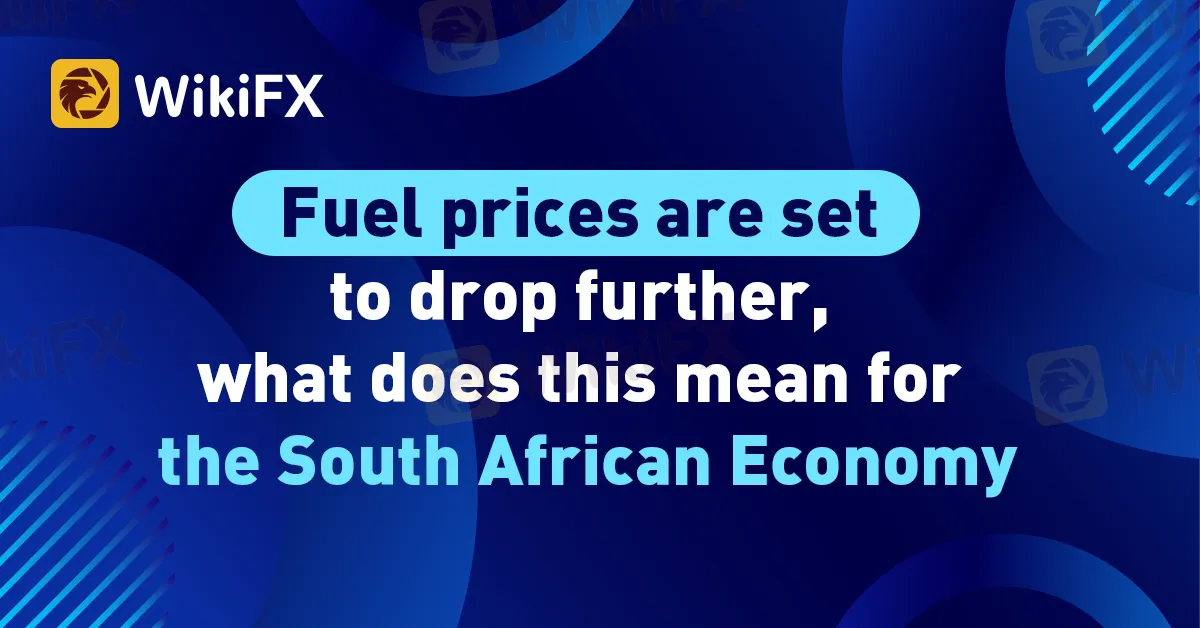简体中文
繁體中文
English
Pусский
日本語
ภาษาไทย
Tiếng Việt
Bahasa Indonesia
Español
हिन्दी
Filippiiniläinen
Français
Deutsch
Português
Türkçe
한국어
العربية
Fuel prices are set to drop further, what does this mean for the South African Economy
Abstract:The whole world has been victim to fuel shortages which caused a sudden spike in fuel prices to record highs. However, different governments have used strategies to reduce these prices and most have been successful as prices have been steadily dropping since their record highs in July. South Africa is one of those countries that succeeded in this endeavor and according to the Central Energy Fund prices are still yet to drop even further. What does this mean for the country's economy and what opportunities does this present for us traders?

The whole world has been victim to fuel shortages which caused a sudden spike in fuel prices to record highs. However, different governments have used strategies to reduce these prices and most have been successful as prices have been steadily dropping since their record highs in July. South Africa is one of those countries that succeeded in this endeavor and according to the Central Energy Fund prices are still yet to drop even further. What does this mean for the country's economy and what opportunities does this present for us traders?
To take advantage of the resulting ZAR movements in the forex markets you are going to need a broker with low fixed spreads and a good customer service record. To find such a broker I recommend you use WikiFx. This app allows you to find the best-regulated brokers with the best user ratings and trading environment. They also keep a list of all the scammer brokers so you can avoid such pitfalls and save yourself from financial harm. So next time you are in the market for a broker, use WikiFx to find the best one for you.
Why are fuel prices set to drop this coming September?
The Central Energy Funds expect fuel prices to fall by just over R2.2 this coming month as fuel prices will be adjusted on the first Wednesday of the month. The South African government has reduced the fuel levy fee in order to reduce the price of fuel for South Africans. This loss in revenue is intended to be made back by the South African government by selling of 5million barrels of oil.
This is good news for the South African economy as the cost of transporting goods and services will become cheaper, the prices of products will become cheaper, and inflation can be kept in check. This means in the coming few months we may see the ZAR gaining some of its strength back.
How can we take advantage of this opportunity as traders?
We should start looking for positions where will can go long on currency pairs that feature the ZAR. On the USDZAR we see the pair is trading right below the R17 per dollar level. We should expect this level to be tested a few times before the pair falls to its renewed strength. We should be on the lookout for spikes in volume to this highlighted level as the market makers will be out to stop-out traders, then a sudden drop in as the selling pressure may suddenly appear to disorient traders. New adjusted fuel prices are announced on the first of every month so we should keep a close eye on this announcement and prepare to trade either way in accordance to the announcement

Disclaimer:
The views in this article only represent the author's personal views, and do not constitute investment advice on this platform. This platform does not guarantee the accuracy, completeness and timeliness of the information in the article, and will not be liable for any loss caused by the use of or reliance on the information in the article.
Read more

Want to Succeed in Forex? Start with the Right Trading System
If you want to trade currencies and make money in the long run, you need a good forex trading system. Many new traders enter the market without a clear plan. Some rely on luck or tips from others. But trading without a system often leads to losses.

Risk Involved with Cabana Capital – Every Trader Should Know
Cabana Capital has changed its name and logo, basically everything about its identity. This seems a bit suspicious, and it's something you should definitely be concerned about. In this article, you’ll learn about the red flags that every trader needs to watch out for.

CME International Records a Massive Jump in Forex Volumes
CME International recorded a record surge in its foreign exchange trading volumes during the second quarter. Check out its performance across products and markets.

Scam Brokers Exposed! FCA Warns Traders to Stay Safe
If you are into forex trading, you need to protect your money from investment scams. Many scam brokers are active in the market now. The FCA, a reputed financial regulator, has issued a list of unlicensed brokers you need to stay away from.
WikiFX Broker
Latest News
US Government Interest Grows in Victory Metals’ Rare Earths Supply
How Are Trade Policies Affecting the Aluminum Market?
RM71,000 Lost in a Share Scheme That Never Existed
Scammed by a Click: He Lost RM300,000 in a Month
Manual vs. Automated Forex Trading: Which One Should You Choose?
Revealing Factors That Help Determine the Gold Price in India
Why Regulatory Compliance Is the Secret Ingredient to Trustworthy Forex Brokers
Pentagon to become largest shareholder in rare earth miner MP Materials; shares surge 40%
Delta shares jump 12% after airline reinstates 2025 profit outlook as CEO says bookings stabilized
Delta shares jump 13% after airline reinstates 2025 profit outlook as CEO says bookings stabilized
Currency Calculator


